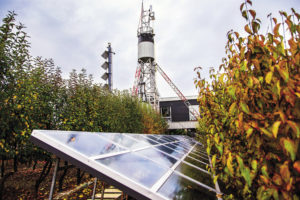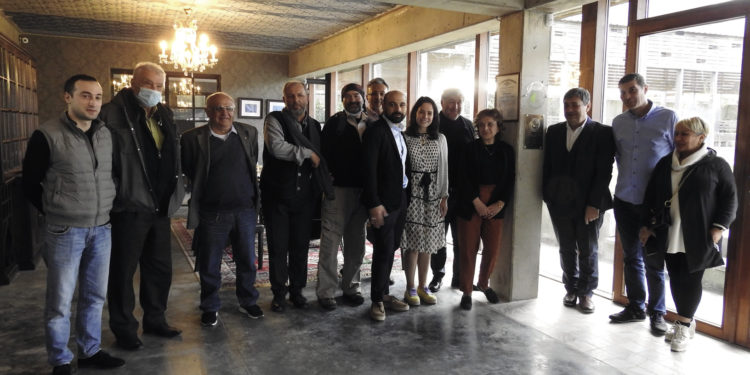“Mr. Kheladze is the author of many important initiatives related to the Georgian architectural industry. We are ready to support his initiatives.” – Davit Abuladze, Head of the Architect’s Union
The circular economy requires a reorganization of the industry into appropriate business models. These models must be much more cost effective than the business models we have had before. To achieve this goal, today, the development of green (sustainable) architecture and approaches is of vital importance for countries worldwide, and Georgia is no exception, especially considering that this field is relatively new to the country and requires a more professional approach, with the involvement of experts for proper development and results.
Sustainable architecture seeks to minimize the negative environmental impact of buildings through efficiency and moderation in the use of materials, energy, development space and the ecosystem as a whole. Sustainable architecture uses a conscious approach to energy and ecological conservation in the design of the built environment.
The Bazaleti Green Engineering Center is among the pioneers in the field locally, actively contributing to introducing sustainable architecture principles and encouraging others to follow their example. It is also one of the few places in Georgia where interested people, especially professionals in architecture and engineering, can learn about the latest approaches and solutions, and use this knowledge in practice in their activities for a better and ‘greener’ future for Georgia, with the chance to make a comparative analysis of the latest technologies on display.

The center is located 60 kilometers from Tbilisi, on 1200 square meters on the shore of Lake Bazaleti, and combines various functional spaces. Located in an amazingly cozy and beautiful environment, the building is completely eco-friendly, and itself follows the principles of sustainable architecture to protect the nature around it, being equipped with solar panels, and using the energy generated.
Further, the space can be hired for conferences or meetings, allowing businesspersons to share the practical experience of the center in terms of sustainable architecture and environmental protection.
Zaal Kheladze is the founder of the Bazaleti Green Engineering Center. The main motivation for him, he tells us, was the active development of green technologies in Georgia, which in turn promises great support to the country’s overall and circular economy. It is noteworthy that Kheladze’s entire family, including his wife and son, have been actively involved in the center’s activities, jointly caring for the development of the green living concept, and promoting environmental protection.
On April 12, a special event was held at the center, seeing its efforts and significant contribution to protecting the country’s ecosystem recognized by the Georgian Union of Architects, who awarded the center building a quality mark for following and maintaining the principles of sustainable architecture. The event was attended by representatives of the Architects’ Union.
Prior to the awards ceremony, the sides jointly discussed various important initiatives and future cooperation prospects, particularly for better results, particularly emphasizing an upcoming project
aimed at encouraging business representatives to join them in establishing green architecture principles in their activities via a contest entitled ‘Green Wine Enterprise 2021.’ The contest, aimed at developing “green” production of wine, and revealing and strengthening the opportunities of running green, ecofriendly businesses in Georgia, envisages the involvement of local winemakers, winemaking being one of the oldest and most distinguished fields of the Georgian economy.
Gradually, the annual contest will be expanded to cover more and more areas, such as healthcare facilities, as medical institutions use a large amount of energy, and establishing an energy efficiency policy and the principles of green architecture in this sector is of utmost importance.
The competition includes various nominations, among them: Best Green Cellar Architectural Project of the Year, Best Engineering Decision of the Year in the Wine Industry, Installation of the Best Green System of the Year in the Georgian Wine Industry, Best Wasteless Winery of the Year, Best Green Startup of the Year in the Wine Industry, Best Green Management of the Year in the Wine Industry, Green Operation and Maintenance of a Winery, Green Innovation in Winemaking, and Green Suppliers and Contractors.
Prior to the competition, seminars in green technologies will be organized for the participating companies. Further, jury members will personally visit and get acquainted with the operation of the participating enterprises.

The jury will include specialists working in the field of green business, as well as specialists in agriculture and the processing industry. Competition prizes will include green certification of businesses that show green approaches in the above nominations. Certification (green business registration) will be carried out based on the competition materials submitted by the Green Business Institute.
During the meeting on April 12, the sides agreed to create a working group consisting of the members of the Bazaleti Green Engineering Center, the Architect’s Union, and representatives of the winemaking sector, to agree and negotiate on the main issues of the contest and also to expand future collaboration opportunities for the healthier and greener future of Georgia.
The working meeting was followed by the awards ceremony, which saw the Architect’s Union head, Davit Abuladze, handing over the prize, a quality mark, to the center for its being so eco-friendly and energy- efficient.
“Today is a day of ‘rebirth,’ as here, in my center, a new idea and new initiative emerged, which is very exciting,” Kheladze said. “We talk a lot about green living, but today we actually started to take concrete steps for the green industry in Georgia. The fact that we chose to start from winemaking should come as no surprise, considering its importance in the country. I’m proud that this center is becoming a hub and initiator for such projects. Our 10 years of work has been well appreciated, with the Architects’ Union awarding us a quality mark, a very exciting prize. This is a mark of architectural quality, giving us even more responsibility, which we take on with pride.”
“We’ve been collaborating with Mr. Kheladze’s company for many years,” said Abuladze. “He’s the author of many important initiatives related to the Georgian architectural industry. Accordingly, we are ready to support his initiatives, because we are well aware that they are aimed at the better future of our country, and based on his knowledge and experience in the field, they are always beneficial. We plan to further expand our collaboration.
“Today, we discussed the interesting idea of a contest on green production of wine in Georgia, where we also plan to join forces,” he added. “Such contests will also encourage representatives of other fields to participate and follow the principles of sustainable architecture and green entrepreneurship, without which it’s unimaginable to care for our natural resources.
“The Center building itself and all the technologies used here are in full accordance with sustainable architecture principles, which is why we appreciated their work and awarded them with a quality mark in Sustainable Architecture. They definitely deserve it!”
The Green Engineering Center has many exciting plans ahead, and it is expected that its contribution to the establishment of green architecture principles in Georgia will expand to cover even more sectors, in collaboration with partner organizations.
BY ANA DUMBADZE














